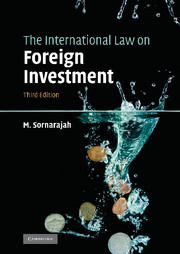Book contents
- Frontmatter
- Contents
- Preface to the third edition
- Preface to the second edition
- Preface to the first edition
- Table of cases
- List of abbreviations
- 1 Introduction
- 2 The shaping factors
- 3 Controls by the host state
- 4 The liability of multinational corporations and home state measures
- 5 Bilateral investment treaties
- 6 Multilateral instruments on foreign investment
- 7 Settlement of investment disputes: contract-based arbitration
- 8 Treaty-based investment arbitration: jurisdictional issues
- 9 Causes of action: breaches of treatment standards
- 10 The taking of foreign property
- 11 Compensation for nationalisation of foreign investments
- 12 Defences to responsibility
- Bibliography
- Index
12 - Defences to responsibility
- Frontmatter
- Contents
- Preface to the third edition
- Preface to the second edition
- Preface to the first edition
- Table of cases
- List of abbreviations
- 1 Introduction
- 2 The shaping factors
- 3 Controls by the host state
- 4 The liability of multinational corporations and home state measures
- 5 Bilateral investment treaties
- 6 Multilateral instruments on foreign investment
- 7 Settlement of investment disputes: contract-based arbitration
- 8 Treaty-based investment arbitration: jurisdictional issues
- 9 Causes of action: breaches of treatment standards
- 10 The taking of foreign property
- 11 Compensation for nationalisation of foreign investments
- 12 Defences to responsibility
- Bibliography
- Index
Summary
As the number of arbitrations under the investment treaties increases and the perception of their legitimacy decreases with conflicting decisions, states have responded in three principal ways. The first has been one of withdrawal from the system of investment arbitration. Some states have announced that they will consider not extending the life of their investment treaties after they expire. Others have sought to withdraw from the ICSID Convention. This response is a calculated decision based on the belief that the costs of arbitration and disputes outweigh the benefits that investment treaties bring to a state. Withdrawal and termination are matters of sovereign prerogative, but such a withdrawal has to be effected through the manner prescribed in the treaty. The effectiveness of withdrawal depends on its timing. Such withdrawal is not possible as to existing disputes or disputes that arose while the treaties were pending. The termination provisions in the treaties are relevant in determining such issues.
The second response is to change at lease future investment treaties so that there is an exclusion of certain sectors such as taxation from arbitration and the inclusion of exceptions to responsibility in the treaty itself. The third has been to argue new types of defences to liability. It is the third response that this chapter will focus on.
It is a relatively new phenomenon that there should be such defences to responsibility in a system which was thought of as providing a virtually unchangeable system of secure protection to foreign investors.
- Type
- Chapter
- Information
- The International Law on Foreign Investment , pp. 453 - 473Publisher: Cambridge University PressPrint publication year: 2010

